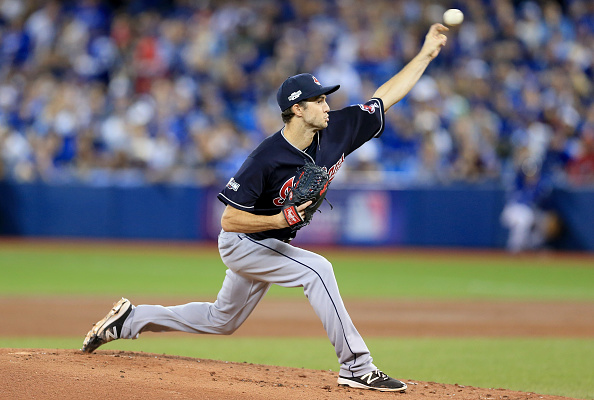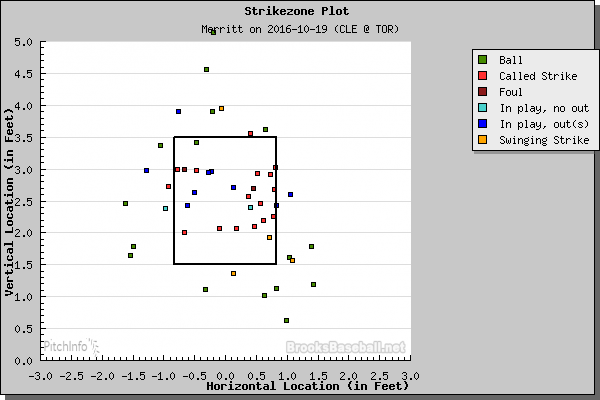This off-season, Ryan Merritt and his fiance spent time writing thank-you cards to fans who purchased gifts for them from their online wedding registry:
Thank you Ryan Merritt and Sarah for the lovely thank you note. You guys are the best! @Indians (cc: @sportsyelling ) pic.twitter.com/I9bi1MjJka
— Rachel Lawrence (@rachieface76) January 14, 2017
It was a kind gesture, indeed. Not as grand, however, like gift like pitching your team, and fan-base, into the World Series.
Merritt did just that, recording a superb, albiet short performance in Toronto in game 5 of the American League Championship Series. The Indians weren’t supposed to beat the Blue Jays that afternoon. Not at a loud and raucous Rogers Centre with an inexperienced rookie on the mound. He had all of 11 big-league innings under his belt, and in terms of prospect helium, he’s not exactly Julio Urias. Let’s be honest, there was a greater chance that Merritt would crack than dazzle. Jose Bautista went as far as to say the youngster would be “shaking in his boots.”
Before the game, Terry Francona admitted that Merritt was nervous. The Cleveland skipper also predicted that those nerves would lessen once the game started.
Merritt’s fastball averaged 86.0 miles per hour, according to BrooksBaseball. It maxed out at 87.5. He got just four swings-and-misses all day, just one coming on the fastball. In a sense, Merritt did what we should’ve expected him to do: put the ball over the plate, between 70-88mph, walk no one, and miss no bats. It just wasn’t as easy to expect that plan to work.
It helps to get ahead. Merritt threw 49 pitches, and he was behind in the count for just eight of them. That means Merritt was either even or ahead in the count for 84% of his pitches. Clayton Kershaw led starters in that stat this year, at 81%. Five of those eight pitches from behind in the count came in Edwin Encarnacion‘s fourth-inning at-bat that ended in a double play. Encarnacion and Ezequiel Carrera were the only Blue Jays to work themselves into a hitter’s count against Merritt.
This is, of course, because Merritt was relentless in attacking the strike zone. He worked to both edges of the plate, and almost completely avoided the middle of the zone:
He faced 14 batters, and he threw first-pitch strikes to 12 of them. That’s a rate of 86% when, again, Kershaw led all starters in that statistic this season, at 70%. The first pitch Merritt threw all night was a called strike to Jose Bautista, and it was a changeup, which should’ve been a clue that this might turn into an unexpected performance. Nobody starts games off with changeups. Nobody throws 4.1 innings of scoreless baseball against one of the league’s most imposing lineups in their second career start to clinch a World Series berth, either.
After that first-pitch changeup to start the game, Merritt went full-Kershaw (lol) by getting a first-pitch strike or out on seven of the next eight batters, with six of those first-pitch strikes or outs coming with his 87mph fastball.
Merritt was, more or less, perfect on the first pitch. Wherever Perez wanted the ball, Merritt put it there. He got first-pitch strikes with all four of the pitches in his arsenal. Only four Blue Jays swung, two put the ball in play, and one got a hit. Merritt almost always got ahead, and the league hit just .223/.266/.352 after falling behind to a first-pitch strike this year. Most of Merritt’s at-bats were close to over before the Blue Jays hitter had swung the bat. As you can see from the video, the Jay’s hitters had trouble picking up the pitch from his hand:
[mlbvideo id=”1207881883″ width=”400″ height=”224″ /]For the night, Merritt threw 80% of his fastballs for strikes. 71% of his curveballs for strikes, and 62% of his cutters for strikes. Only his changeup — unanimously agreed upon as his best pitch — went for a strike fewer than half the time, and even that was a strike four of nine times, accounting for two of his four swinging strikes.
Merritt threw hittable pitches. Most anything over the plate with his velocity and movement is going to be hittable. You see those five blue squares closest to the center of the plate in the strikezone plot from above, indicating in play, out(s). Those pitches won’t always be outs for Ryan Merritt. Those pitches will lead to damage. But these pitches didn’t lead to damage. Of Merritt’s 10 pitches closest to the heart of the plate, five went for strikes, four went for outs, and just one went for a hit. Call it good fortune. Call it hitters swinging on the defensive.
Call it whatever you want. It was probably a bit of both.
Ryan Merritt called it a start he’ll never forget.
The Indians called it a trip to the World Series.
Add The Sports Daily to your Google News Feed!

